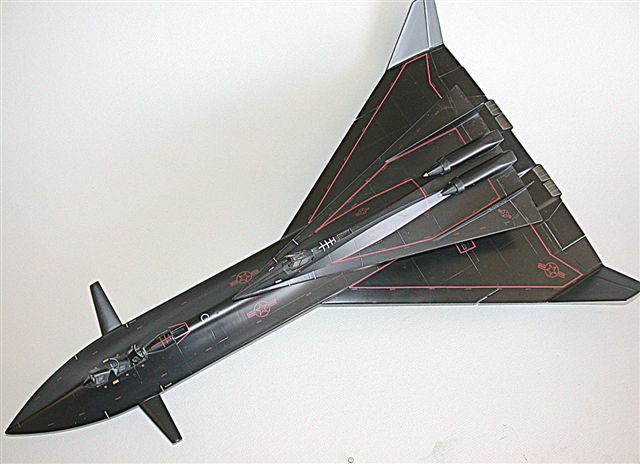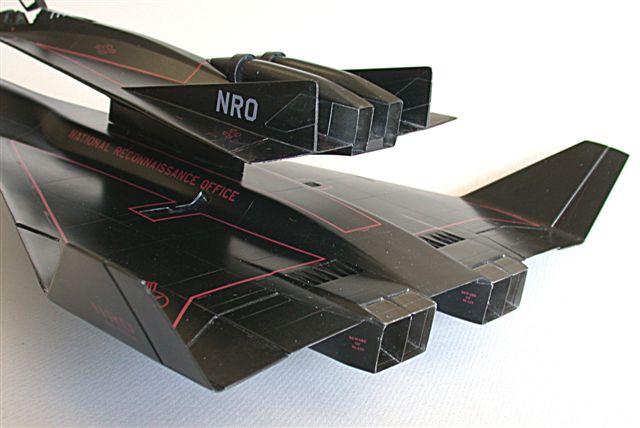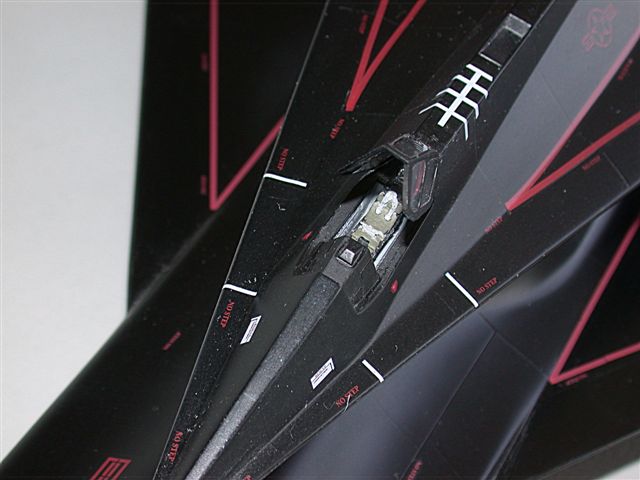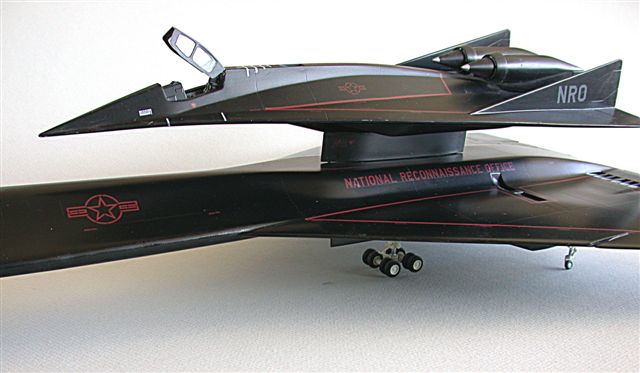|
Testor's SR-75 Penetrator & X-7
Thunder Dart
Blackest of the Black
by "Bondo" Phil Brandt
|
 |
|
SR-75 Penetrator & X-7 Thunder Dart |

HyperScale is proudly sponsored by Squadron
The very recent
revelations by Aviation Week and Space Technology (AWST) that all those
rumors and supposed sightings over the past decades of an SR-71
follow-on program, code-named “Aurora”, may not have been that far
removed from reality. AWST posits that the super “black” reconnaissance
system may in fact be in seclusion, mothballed at Groom Lake or at a
rumored, highly classified new test site in Colorado.
Employees of the Black Projects Division of Bondo Industries weren’t
surprised at the news because they, too, had always believed that there
was no way the A-12/SR-71/Tagboard programs could be allowed to die with
no air breathing progeny. Thus, these modeling stalwarts long ago
availed themselves of the now hard-to-find Testor SR-75 mother ship and
its separately available X-7 Thunder Dart air launched, high-Mach
reconnaissance vehicle.

Highly respected John Andrews of Testor Corporation was a key proponent
in that company’s past titillation of the world modeling community
through the release of more than one imagined development in the Black
World of aviation. John didn’t go into projects willy-nilly and was
careful to lay reasonable foundations for his creations. It has been
said that Testors early release of their F-117 impression put real world
engineers at the famous Lockheed Skunk Works into a tizzy.
Both kits are of the tough
black plastic so typical of the Testors YF-12A and SR-71 kits, and the
so-so fit should not surprise any but the most recent aircraft plastic
modeling enthusiast. Molding is very smooth, but parts are not as
delicately done–some might term them “clunky”--as today’s Tamiyagawa
releases . Raised paneling is also typical, but rescribing the
relatively simple lines was no big deal.
Detailing
The large expanse of black
airframe in the SR-75–in 1/72 it’s essentially as large as the 1/48
Testors Blackbirds–cried out for some detailing to break things up.
Thus, it was decided to do an open canopies configuration, including
that of the X-7.

The Testor’s interiors are
very plain, so the Monogram SR-71 was “cannonballed” for mother ship
consoles; four aftermarket ACES II seats are from True Details.
The SR-75's variegated
gray scheme pictured on the box art seemed somewhat hokey, and it was
thought that an all-black National Reconnaissance Office operational
scheme would provide a much more menacing effect.
The industrial strength red walkway stripes on the decal sheet dictated
a very glossy surface for proper decal adhesion, and this curmudgeon
wasn’t interested in shooting coat after coat of gloss clear acrylic or
Future over a flat black undercoat to bring up the gloss appropriately.
Thus, gloss black was laid on via Tamiya spraycan. Testor Metallizers
were used in the exhaust area.

Once the decals were applied to a well-cured (days) surface, multiple
coats of Testors flat clear water-based acrylic were airbrushed to build
up a suitably thick layer above the decals so that the flat clear could
be wetsanded to a desired smooth, semigloss sheen; MicroMesh up through
8000 grit worked very well.
Rarely, if ever, does
Bondo Industries go the fantasy route, but it was felt that this project
was not without some basis in fact, especially the inflight description
offered by an offshore oil platform worker (a seasoned aircraft
observer) near Macrihanish, Scotland. I certainly don’t know what lurks
up at Area 51, but I do know that my brother, after touring said
facility in the mid-Seventies, replied to my joking inquiry as to what
he saw, “You would be very proud of your country.”
Aurora, The Pentagon’s Secret Hypersonic Spyplane
Bill Sweetman, 1993.
Motorbooks International, ISBN 0-87938-780-7
Model, Images and Text Copyright ©
2006 by Phil Brandt
Page Created 24 April, 2006
Last Updated
24 April, 2006
Back to
HyperScale Main Page
|
Home
| What's New |
Features |
Gallery |
Reviews |
Reference |
Forum |
Search